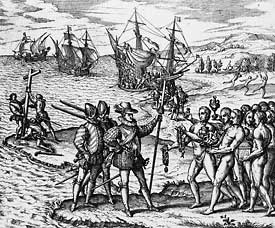Study: Explorer still widely admired
By Diane Swanbrow
News Service
Decades after revisionist historians and Native Americans began to question history's account of the reputation of Christopher Columbus, 85 percent of Americans still describe him in positive and traditional terms, according to a U-M study.
Most respondents in a national representative sample of Americans view Columbus in positive historical terms—"He discovered America." Another 6 percent characterize the Genovese explorer as a hero.
Two percent of those surveyed say that Columbus could not have discovered America because Native Americans already were here. And 4 percent characterize Columbus as a villain who brought slavery, disease and death to indigenous peoples.
"The inertia of collective memory has sustained Columbus's reputation in the face of criticisms," says Howard Schuman, a research scientist and professor emeritus at the Institute for Social Research (ISR) and the lead author of "Elite Revisionists and Popular Beliefs: Christopher Columbus, Hero or Villain?" published in the Spring 2005 issue of Public Opinion Quarterly.
The research was supported, in part, by the National Science Foundation.
For the study, Schuman and co-authors Barry Schwartz and Hannah D'Arcy analyzed results of several national surveys and the content of American high school history textbooks to assess the general public's beliefs about Columbus.
The surveys were conducted by ISR in 1998, 2000 and 2002, and included more than 2,000 Americans age 18 and older.
Schuman and colleagues found that older people were more likely than younger ones to view Columbus as a heroic figure, suggesting some decrease over time in a glorified view of his reputation. But Schuman notes there has been a general erosion of the historic reputations of past U.S. leaders, so the trend could reflect a wider disillusionment with historical heroes rather than a reassessment of Columbus's specific contributions.
Examining the views of American minorities, the researchers found that 42 percent of Native Americans believe Columbus was a villain, compared to less than 4 percent of white, Hispanic and Black respondents. But fully 50 percent of Native Americans express the traditional view that Columbus discovered America. About 2 percent of African Americans view Columbus as a hero, compared with 6 percent of whites and
11 percent of Hispanics.
The researchers also analyzed statements about Columbus from 55 high school history textbooks dating from the mid-1940s through the 1990s, coding the passages as positive or negative. The overall pattern was curvilinear, with characterizations of Columbus starting off as predominately positive (in 91 percent of books published between 1944-59), moving to much more negative characterizations in the 1970s (only 17 percent showing positive evaluations of Columbus) and then recovering a more positive view in the 1980s and 1990s (with 40 percent and 80 percent, respectively, showing positive characterizations).
Schuman concludes that criticisms of Columbus have reached the larger public in reduced form, without the full negative force found in revisionist writings and American Indian protests. Strong countervailing forces, including Columbus Day celebrations and recognition by schools, continue to sustain his positive reputation, Schuman says.
Ultimately, the narrative of his voyage in 1492 taps into the power of creation stories, Schuman says, and illustrates the gap that exists in many dimensions between the beliefs of the general public and the views of elite groups and minority activists. |


